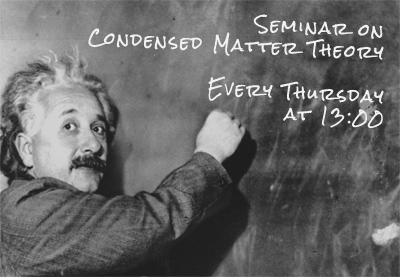Seminar on Condensed Matter Theory
Group of Theoretical Physics at the Department of Condensed Matter Physics
of Charles University has a pleasure to invite you to attend the seminar
on 23rd May 2024 at 14:00
at Faculty of Mathematics and Physics of Charles University, Ke Karlovu 5, 121 16 Praha 2
Seminar room F 052
Prof. Didier Sébilleau
Département Matériaux-Nanosciences of the Institut de Physique de Rennes
The memory function approach: The Swiss army knife of statistical physics - application to dielectric functions
Prof. Didier Sébilleau » The memory function approach: The Swiss army knife of statistical physics - application to dielectric functions
Département Matériaux-Nanosciences of the Institut de Physique de Rennes
Location: Lecture room F2 (MFF UK, Ke Karlovu 5)
In this talk, I will introduce the memory function method, also called the Zwanzig-Mori projection method. Based on the fundamental work of Kubo, it was introduced to incorporate properly the effect of fast moving variables into the dynamics of slow moving variables. I will specialize this method to the particular case of autocorrelation functions, and more specially that
of response functions. By doing so, I will show how this method allows to devise an accurate and flexible way to model dielectric functions from the prior knowledge of their moments, within the homogeneous electron gas.
The basic level of the memory function approach allows to build up dielectric functions incorporating both the conservation of the number of particles and correlation effects. This makes it more accurate that the usual RPA approach. It relies on a non-Markovian effect where a relaxation function allows to model the "memory" of the system that has been excited.
Generalisation to incorporate the conservation of the momentum, of the energy, or of triplet correlation will also be derived.
As the memory function embodies a decay channel in the system (for instance after plasmon excitation), a further generalisation that incorporates several decay channels will be derived.
Application to the modeling of the dielectric function of Aluminium will be given. As the homogeneous electron gas is electronic-structureless, we will benchmark the model with ab-initio calculations, in order to assess the importance of the band structure in the calculation of dielectric functions.
A discussion on the incorporation of phonon effects will also be discussed.


